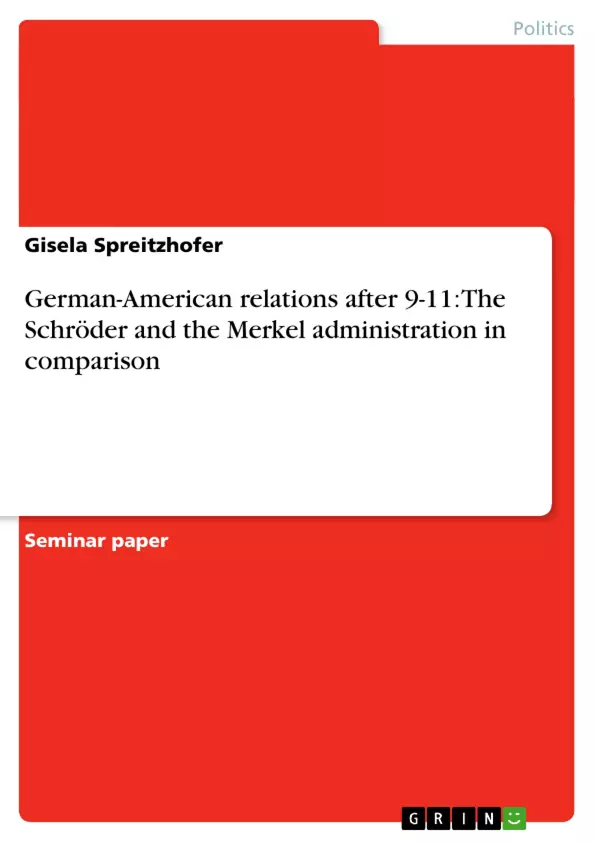Most of the second half of the 20th century was marked by a strong German-American relationship whose primary roots were the United States’ military contributions in the fight against Nazi-Germany during World War II and its generous Marshall Plan to help rebuild a moribund German post-war economy. After the outbreak of the Cold War, deepening the transatlantic relations was a strategic necessity for both sides of the Atlantic, given the imminent geopolitical threat from the communist Soviet Union. In the decades to follow, ameliorating the partnership with the United States was, besides fostering European integration, the major goal of German foreign policy.
However, the transatlantic relationship changed significantly after the end of the Cold War in the early 1990s. In the aftermath of the terrorist attacks of September 11, 2001 the German-American relationship was put to a particularly hard test. Although the Schröder administration’s first reaction was unlimited solidarity and support for the invocation of Article 5 of the NATO treaty, Germany did not support the United States’ decision to go to war in Iraq, which implied serious tensions with the Bush administration.
This paper’s purpose is to show how the relationship between Germany and the United States has evolved during the last five years. In the first part, I would like to illustrate the evolution of Germany’s foreign policy towards the United States in the aftermath of September 11 until the outbreak of the Iraq war. I will describe the primary factors leading to the drastic deterioration of transatlantic relations, such as chancellor Gerhard Schröder’s opportunistic exploitation of the Iraq issue in his election campaign. But the leaders’ personalities alone do not suffice to explain the whole picture. Thus the paper’s second part will elaborate on the German public mood, characterized by anti-Americanism, pacifism, and emancipation from the United States. The third part will be dedicated to the question why Bush and Schröder’s successor Angela Merkel get along so well – given their different backgrounds and taking into account that the Grand Coalition has not significantly changed policy on issues of division with Bush. An outlook in the future of the German-American partnership will conclude the paper in the fourth and last part.
Inhaltsverzeichnis (Table of Contents)
- FROM 9-11 TO THE OUTBREAK OF THE IRAQ WAR
- THE PUBLIC'S ATTITUDE TOWARDS THE UNITED STATES
- GERMAN-AMERICAN RELATIONS AFTER 9-11: THE MERKEL ADMINISTRATION
- THE FUTURE OF GERMAN-AMERICAN RELATIONS
Zielsetzung und Themenschwerpunkte (Objectives and Key Themes)
This paper aims to analyze the evolution of German-American relations from the aftermath of the September 11 attacks to the present. The paper focuses on the challenges faced by the relationship due to the Iraq War and the subsequent changes in German public opinion.
- The impact of the September 11 attacks on German-American relations
- The role of the Iraq War in deepening tensions between Germany and the United States
- The changing attitudes of the German public towards the United States
- The relationship between the Schröder and Merkel administrations and the United States
- The future prospects for German-American cooperation
Zusammenfassung der Kapitel (Chapter Summaries)
- The first chapter explores the period from the September 11 attacks to the outbreak of the Iraq War, examining how the German public initially demonstrated solidarity with the United States but later became increasingly critical of American foreign policy.
- The second chapter focuses on the changing public opinion in Germany towards the United States, analyzing the rise of anti-American sentiment, pacifism, and a desire for greater autonomy from American influence.
- The third chapter examines the relationship between the Merkel administration and the United States, discussing the challenges and opportunities presented by the Grand Coalition and the potential for a more cooperative relationship.
Schlüsselwörter (Keywords)
The primary keywords and focus topics of this paper include German-American relations, the Iraq War, public opinion, transatlantic cooperation, anti-Americanism, pacifism, and European integration. The paper explores the evolution of these themes within the context of the post-Cold War era and the challenges posed by the "war on terror."
Frequently Asked Questions about German-American Relations
How did the 9-11 attacks impact German foreign policy?
Initially, the Schröder administration showed "unlimited solidarity," but the relationship later strained due to Germany's refusal to support the Iraq War.
Why did tensions arise between Chancellor Schröder and President Bush?
The primary factors were Germany's opposition to the Iraq War and Schröder's use of the issue during his election campaign.
How did public opinion in Germany change after 2001?
The public mood became characterized by rising anti-Americanism, pacifism, and a desire for emancipation from U.S. influence.
How did Angela Merkel's approach differ from her predecessor?
Merkel sought a more cooperative relationship with the Bush administration, despite maintaining some policy differences inherited from the Grand Coalition.
What are the historical roots of the German-American partnership?
The relationship was built on the U.S. role in WWII, the Marshall Plan, and mutual security interests during the Cold War.
- Citar trabajo
- MMag. M.A. Gisela Spreitzhofer (Autor), 2006, German-American relations after 9-11: The Schröder and the Merkel administration in comparison, Múnich, GRIN Verlag, https://www.grin.com/document/68072



